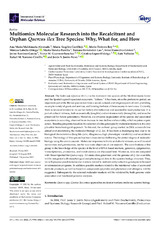Multiomics Molecular Research into the Recalcitrant and Orphan Quercus ilex Tree Species: Why, What for, and How
Autor
Maldonado-Alconada, Ana M.
Castillejo-Sánchez, María A.
Rey, María Dolores
Labella-Ortega, Mónica
Tienda-Parrilla, Marta
Hernández-Lao, Tamara
Honrubia-Gómez, Irene
Ramírez-García, Javier
Guerrero-Sánchez, Víctor M.
López-Hidalgo, Cristina
Valledor, Luis
Navarro Cerrillo, Rafael M.
Jorrin Novo, J.V.
Editor
MDPIFecha
2022Materia
Quercus spp.Quercus ilex
Omics approaches
Molecular markers
Resilience
Systems biology
METS:
Mostrar el registro METSPREMIS:
Mostrar el registro PREMISMetadatos
Mostrar el registro completo del ítemResumen
The holm oak (Quercus ilex L.) is the dominant tree species of the Mediterranean forest and the Spanish agrosilvopastoral ecosystem, “dehesa.” It has been, since the prehistoric period, an important part of the Iberian population from a social, cultural, and religious point of view, providing an ample variety of goods and services, and forming the basis of the economy in rural areas. Currently, there is renewed interest in its use for dietary diversification and sustainable food production. It is part of cultural richness, both economically (tangible) and environmentally (intangible), and must be preserved for future generations. However, a worrisome degradation of the species and associated ecosystems is occurring, observed in an increase in tree decline and mortality, which requires urgent action. Breeding programs based on the selection of elite genotypes by molecular markers is the only plausible biotechnological approach. To this end, the authors’ group started, in 2004, a research line aimed at characterizing the molecular biology of Q. ilex. It has been a challenging task due to its biological characteristics (long life cycle, allogamous, high phenotypic variability) and recalcitrant nature. The biology of this species has been characterized following the central dogma of molecular biology using the omics cascade. Molecular responses to biotic and abiotic stresses, as well as seed maturation and germination, are the two main objectives of our research. The contributions of the group to the knowledge of the species at the level of DNA-based markers, genomics, epigenomics, transcriptomics, proteomics, and metabolomics are discussed here. Moreover, data are compared with those reported for Quercus spp. All omics data generated, and the genome of Q. ilex available, will be integrated with morphological and physiological data in the systems biology direction. Thus, we will propose possible molecular markers related to resilient and productive genotypes to be used in reforestation programs. In addition, possible markers related to the nutritional value of acorn and derivate products, as well as bioactive compounds (peptides and phenolics) and allergens, will be suggested. Subsequently, the selected molecular markers will be validated by both genome-wide association and functional genomic analyses.

